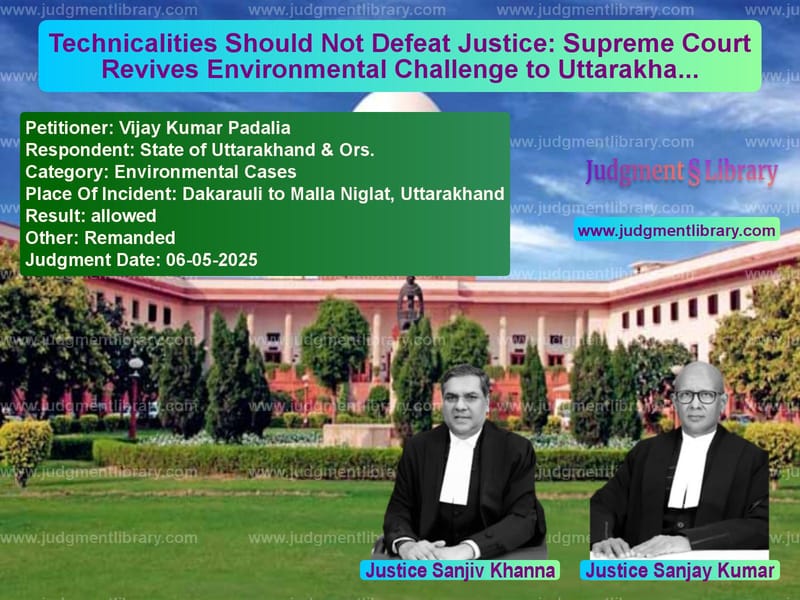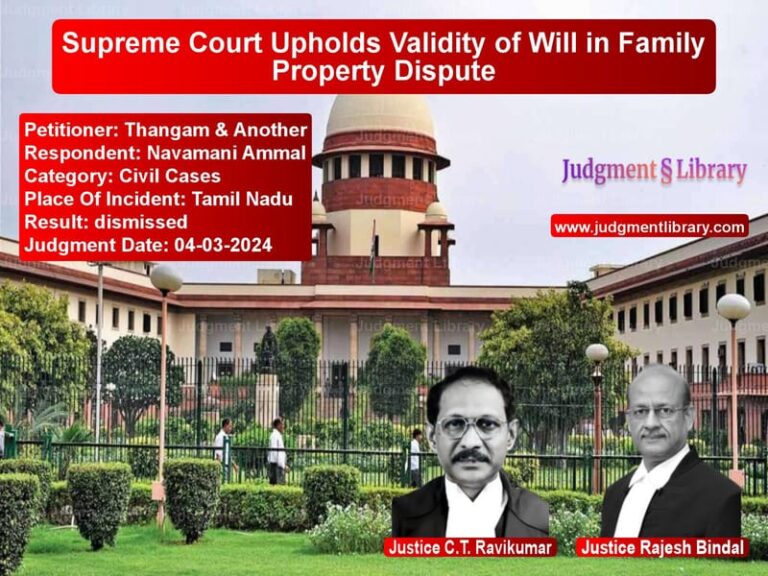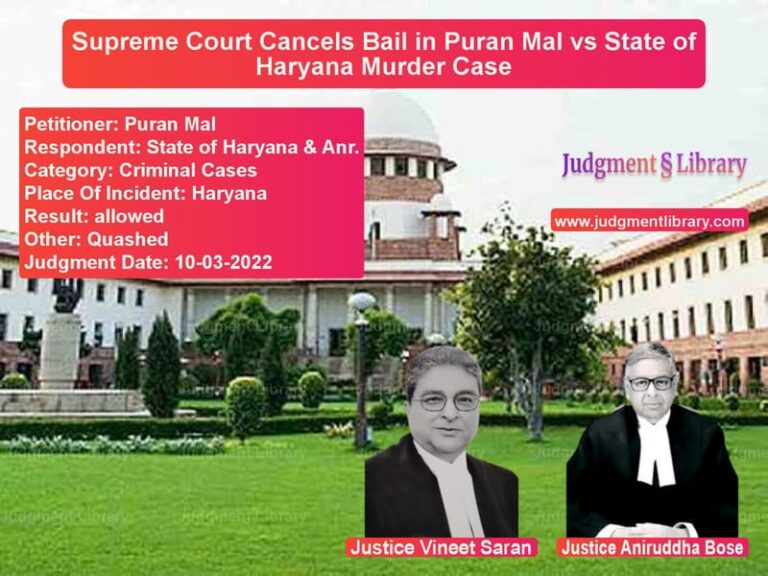Technicalities Should Not Defeat Justice: Supreme Court Revives Environmental Challenge to Uttarakhand Road Project
In a significant ruling that emphasizes substance over form in environmental litigation, the Supreme Court of India has revived a challenge against a road construction project in Uttarakhand that had been dismissed on purely technical grounds. The case involving Vijay Kumar Padalia versus the State of Uttarakhand represents a classic confrontation between environmental protection and development projects, but more importantly, it highlights the critical balance between procedural technicalities and substantive justice in environmental jurisprudence.
The legal battle began when Vijay Kumar Padalia filed an application before the National Green Tribunal (NGT) seeking to restrain the authorities from constructing a motor road from NH-87 (now NH-109) at Dakarauli to Malla Niglat. His primary concern was the potential environmental damage, specifically requesting directions “not to cut, destroy, damage or degrade any tree/forest cover.” This initial application was withdrawn with permission to file a more comprehensive petition incorporating subsequent developments, particularly after the appellant learned about the issuance of forest clearance for the project.
Acting on this liberty, Padalia filed what he believed was a comprehensive petition under Section 14 of the National Green Tribunal Act, 2010, which was registered as Original Application No. 522/2018. However, the NGT dismissed this application not on its merits but on the technical ground that since the order granting sanction was being challenged, the appellant should have filed an appeal under Section 16 of the NGT Act instead of an original application under Section 14. This procedural dismissal led to the appeal before the Supreme Court, raising fundamental questions about access to environmental justice.
Read also: https://judgmentlibrary.com/auroville-township-plan-dispute-supreme-court-overturns-ngt-orders/
The Supreme Court’s Critique of Technical Justice
The Supreme Court, in a bench comprising Chief Justice Sanjiv Khanna and Justice Sanjay Kumar, expressed strong disapproval of the NGT’s approach. The Court declared in unequivocal terms: “Having heard learned counsel for the parties, we are of the view that this is a case where there has been miscarriage of justice and technicalities have been overstretched to dismiss and oust the appellant, Vijay Kumar Padalia.”
This powerful statement encapsulates the Court’s philosophy that environmental justice should not be sacrificed at the altar of procedural technicalities. The Court recognized that the appellant had acted in good faith and in compliance with the NGT’s own earlier order that granted him liberty to file a comprehensive application. The judgment noted: “It is quite apparent that the appellant, Vijay Kumar Padalia, had proceeded in terms of and in accord with the language of the order dated 02.08.2018 passed by the NGT itself.”
The Court’s reasoning reflects a profound understanding of the practical challenges faced by environmental litigants, particularly individuals taking on state authorities. Rather than being strict about the form of the application, the Court emphasized the substance of the environmental concerns raised.
Practical Solutions Over Procedural Rigidity
What makes this judgment particularly significant is the practical and solution-oriented approach adopted by the Supreme Court. Instead of merely criticizing the NGT’s decision and remanding the matter with vague directions, the Court provided specific, workable solutions to rectify the procedural error.
The Court stated: “Even accepting that the order granting sanction is appealable, the National Green Tribunal, Principal Bench, New Delhi, should have permitted the appellant, Vijay Kumar Padalia, to either amend the Original Application, as filed, or permitted him to file a fresh appeal under Section 16 of the NGT Act.”
This observation highlights the Court’s expectation that specialized tribunals like the NGT should assist litigants in navigating procedural requirements rather than using them as barriers to justice. The Court essentially held that when a litigant makes a bona fide error in choosing the appropriate procedural route, the tribunal should guide them toward the correct path rather than dismissing their case outright.
In a clear demonstration of this principle, the Supreme Court itself provided the remedy that the NGT should have granted: “We set aside the impugned judgment dated 24.10.2018 with an order of remand to the NGT. Original Application No. 522/2018 will be treated as an appeal under Section 16 of the NGT Act, preferred by the appellant, Vijay Kumar Padalia.”
The Court went further by granting “liberty to the appellant, Vijay Kumar Padalia, to amend the said Original Application to bring it in conformity with the procedural requirements of an appeal, as stipulated.” Additionally, recognizing that some issues might properly belong in an original application rather than an appeal, the Court allowed the appellant to “file a separate petition under Section 14 of the NGT Act” within three weeks.
Addressing the Limitation Concern
One of the key practical hurdles in converting an original application into an appeal is the issue of limitation periods. Appeals typically have strict time limits, and by the time the Supreme Court intervened, the statutory period for filing an appeal might have expired.
The respondents rightly raised this concern, with the judgment noting: “Learned counsel for the respondents has submitted that the issue of limitation may arise in so far as the appeal is concerned.”
However, the Supreme Court proactively addressed this potential obstacle by providing clear guidance on how the limitation issue should be handled. The Court stated: “If required and necessary, it will be open to the appellant, Vijay Kumar Padalia, to file an application seeking condonation of delay and rely upon Section 14 of the Limitation Act, 1963.”
More significantly, the Court clarified that “we also accept the submission that exclusion of time on account of bona fide proceedings will apply, notwithstanding the upper time limit fixed for condonation of delay.” This interpretation is crucial because it recognizes that time spent pursuing a bona fide but procedurally incorrect remedy should not count against the limitation period for the correct remedy.
Additionally, the Court acknowledged another important principle in environmental litigation: “Further, the appellant, Vijay Kumar Padalia, will be entitled to raise the plea that the order was never communicated and, therefore, the limitation period would commence only from the date of knowledge.” This is particularly relevant in environmental cases where regulatory approvals may not be properly communicated to affected parties or concerned citizens.
Preserving the Status Quo
Understanding the potential for irreversible environmental damage during protracted litigation, the Supreme Court took care to preserve the status quo. The Court noted that an interim order had been passed on December 7, 2018, which had been continued thereafter. The judgment directed that “the interim order passed by this Court on 07.12.2018, which was continued thereafter, shall continue to operate for a period of two months from today.”
However, recognizing the NGT’s primary jurisdiction over the matter, the Court clarified that “the NGT, upon listing of the matters, would be entitled to modify, vacate or confirm the aforesaid interim order dated 07.12.2018, notwithstanding the fact that we have directed the said interim order to be continued for two months.”
This balanced approach ensures environmental protection during the transition period while respecting the NGT’s authority to make appropriate interim orders based on its assessment of the case.
Expedited Hearing Directive
Acknowledging that environmental litigation often involves time-sensitive issues where delays can lead to irreversible damage, the Supreme Court specifically directed expedited hearing of the matter. The Court stated: “In view of the period of time that this litigation has been pending, we request the NGT to take up the matter for hearing expeditiously.”
This direction is consistent with the Supreme Court’s approach in environmental matters, where it has repeatedly emphasized the need for timely resolution given the potential for permanent ecological damage.
Broader Implications for Environmental Justice
The Supreme Court’s judgment in Vijay Kumar Padalia vs State of Uttarakhand has significant implications for environmental justice in India. First and foremost, it reinforces the principle that technicalities should not defeat substantive environmental justice. This is particularly important in environmental litigation where individual citizens or community groups often lack the legal resources to navigate complex procedural requirements.
Secondly, the judgment establishes that specialized environmental tribunals should adopt a facilitative rather than a restrictive approach to procedure. When bona fide litigants make procedural errors, tribunals should guide them toward correction rather than punishing them with dismissal.
Thirdly, the Court’s liberal approach to limitation periods in environmental matters recognizes the practical realities of public interest litigation. The principles articulated regarding exclusion of time for bona fide proceedings and commencement of limitation from the date of knowledge make environmental justice more accessible to concerned citizens.
Fourthly, the judgment demonstrates the Supreme Court’s role as a protector of access to justice. By intervening to correct what it termed a “miscarriage of justice,” the Court fulfilled its constitutional role of ensuring that technical procedural rules do not become insurmountable barriers to justice.
Finally, the case highlights the continuing tension between development projects and environmental protection in India. While the Supreme Court did not rule on the merits of the road project, by reviving the legal challenge, it ensured that environmental concerns would receive proper judicial consideration rather than being dismissed on technical grounds.
Conclusion
The Supreme Court’s decision in this case represents a significant victory for environmental justice and a reaffirmation of the principle that technicalities should not triumph over substantive rights. By converting the original application into an appeal and providing clear guidance on overcoming limitation issues, the Court has ensured that the environmental concerns regarding the Uttarakhand road project will be heard on their merits.
The judgment sends a strong message to all judicial forums, particularly specialized tribunals, that procedural rules are meant to facilitate justice rather than hinder it. As environmental challenges continue to grow in complexity and importance, this approach becomes increasingly crucial in ensuring that citizens have meaningful access to environmental justice.
While the ultimate decision on the road project will now rest with the NGT after considering all environmental aspects, the Supreme Court has ensured that this decision will be made based on the substantive environmental merits rather than procedural technicalities. In doing so, the Court has strengthened the foundations of environmental democracy in India and reaffirmed the judiciary’s role as a guardian of both environmental protection and access to justice.
As India continues to balance development needs with environmental conservation, this judgment will serve as an important precedent ensuring that environmental concerns receive proper judicial consideration and that procedural hurdles do not prevent citizens from raising legitimate environmental issues before the appropriate forums.
Petitioner Name: Vijay Kumar Padalia.Respondent Name: State of Uttarakhand & Ors..Judgment By: Justice Sanjiv Khanna, Justice Sanjay Kumar.Place Of Incident: Dakarauli to Malla Niglat, Uttarakhand.Judgment Date: 06-05-2025.Result: allowed.
Don’t miss out on the full details! Download the complete judgment in PDF format below and gain valuable insights instantly!
Download Judgment: vijay-kumar-padalia-vs-state-of-uttarakhand-supreme-court-of-india-judgment-dated-06-05-2025.pdf
Directly Download Judgment: Directly download this Judgment
See all petitions in Environmental Cases
See all petitions in Public Interest Litigation
See all petitions in Judicial Review
See all petitions in Judgment by Sanjiv Khanna
See all petitions in Judgment by Sanjay Kumar
See all petitions in allowed
See all petitions in Remanded
See all petitions in supreme court of India judgments May 2025
See all petitions in 2025 judgments
See all posts in Environmental Cases Category
See all allowed petitions in Environmental Cases Category
See all Dismissed petitions in Environmental Cases Category
See all partially allowed petitions in Environmental Cases Category







